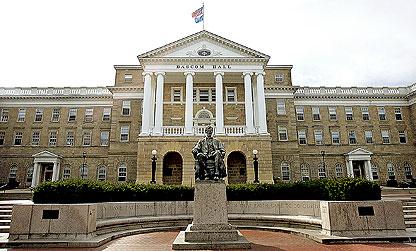Less than half of science, technology, engineering and math majors graduate with their intended degree, having some education experts pointing fingers at professors.
A national push for increased focus on STEM education outlined in a 2012 report called for an increase of 1,000,000 STEM professionals over the next decade to remain competitive nationally. But University of Wisconsin education researcher Mark Connolly said this is a tall order given only 19 percent of students will graduate with a STEM degree.
With only 40 percent of intended STEM majors actually graduating with those degrees, Connolly said a big part of the problem lies in the quality of STEM teaching.
“We have the case where high performing students leave STEM majors because they say they’re uninspiring and they want to go to something that’s more engaging for them,” Connolly said. “They don’t want to be lectured to in every class.”
Connolly said while STEM faculty know their complicated subjects well, they often are not prepared to relay this information in an engaging way to students. He said STEM doctoral students almost exclusively receive their degrees from research institutions that place far more emphasis on innovative research than teaching.
“There is a fear that if I as a graduate student devolve my interest in teaching, my research advisor will disown me or keep me out of a lab, as sometimes happens,” Connolly said.
In effect, he said teaching strategies that engage students, such as working on activities together, conducting experiments and keeping materials relevant, often go neglected among professors who obtain degrees at research institutions.
However, while a PhD remains chiefly a research degree, graduate education – especially at UW – is in the midst of changes focused on improvements in teaching quality, Robert Mathieu, UW astronomy professor and Wisconsin Center for Education Research director, said.
Mathieu said UW has been a pioneer in establishing programs to address inadequacies in undergraduate STEM teaching. These include the Delta Program, which aims to improve teaching practices for doctoral students in STEM, and Madison Teaching and Learning Excellence, which has the same goals but works with beginning faculty members.
The Delta Program is a founding member of the Center for the Integration of Research, Teaching and Learning, a network of 23 universities which attempts to develop STEM faculty committed to higher quality teaching practices.
Mathieu said programs such as these not only help faculty improve teaching, but also help doctoral students and faculty learn ethics and leadership skills in the case they enter the professional workforce.
While UW is a pioneer among universities pushing for higher quality of teaching in STEM, these types of programs are not in widespread use on college campuses and are usually not a requirement, Connolly said.
“[These programs] can only work with the folks who want to improve their teaching and who see the issue,” Connolly said. “It’s important to convince faculty that it’s okay to participate in these programs.”
Connolly said attempts to improve STEM teaching have unfortunately occurred during a time of state budget cuts, which he claims will demand too much of professors.
Because of cuts, he said faculty will be obliged to put more hours into teaching to improve student outcomes while also having to step up research efforts to bring in money for the university.














